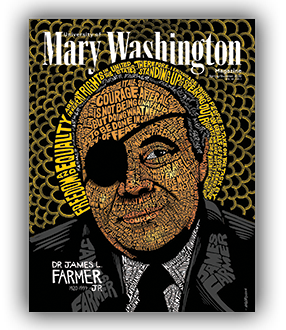By Emily Freehling
When Christopher Williams entered the James Farmer Scholars Program at the University of Mary Washington as a seventh-grader from Spotsylvania County, he couldn’t foresee the opportunities the program would open to him.
“Neither of my parents went to college, and this program afforded me the opportunity to come to a college campus not far from where I lived,” said Williams, who graduated from Virginia Commonwealth University. Today he is assistant director of UMW’s James Farmer Multicultural Center. “It really changed my life.”
The James Farmer Scholars Program, which welcomed its first class of students in 1988, was the vision of retired Vice President for Academic Affairs Philip Hall.

“He knew that we needed to think about access for African-American students,” said Professor of Education Venitta McCall, the program’s founding director. “He wanted something for African-American children in our area to talk about college access and opportunity.”
McCall was already familiar with this work. At the time, she was director of Upward Bound – a federal program that provides academic support to low-income and first-generation college-bound students.
McCall and Hall worked to build something that wouldn’t have the eligibility restrictions of a federal program and would reach students before they hit high school. James Farmer Scholars enter the program in seventh grade. They attend a daylong Saturday program at Mary Washington every month and spend a week in residence on campus each summer.
The program includes students from four area school districts – Fredericksburg and the counties of Westmoreland, Caroline, and Spotsylvania. Each district appoints a school-based sponsor to help support students in their home schools.
One of the early sponsors was Fredericksburg native Marci Catlett, a teacher, administrator, and now superintendent of the Fredericksburg City Public Schools. Catlett, Fredericksburg-area community leader and educator Marguerite Young, and National Education Association secretary-treasurer Princess Moss ’83 helped build a curriculum around the contributions African-Americans have made to literature, the arts, science, and mathematics. “The message was always, ‘You can do this, too,’” McCall said.
Reggie Samuel, a James Farmer Scholar when he attended Caroline County middle and high schools from 1992 to 1997, said the program greatly influenced him. “It was phenomenal. It had a huge impact on how I saw the world and the opportunities that were available for me, and how I should navigate the pursuit of those opportunities,” he said.
Samuel graduated from Virginia Tech and is founder and managing director of the Leumas Group, a financial services firm in Spotsylvania County. Samuel’s son, an eighth-grader, is now in his second year in the James Farmer Scholars Program, and Samuel is working with others at Mary Washington to position the program for future success.
UMW paused new classes entering the program after fall 2018. Leaders began to reimagine the program to better match available resources and the needs of today’s students, whose schedules are busier and who have more enrichment opportunities than when the program started in the 1980s.
In Samuel’s view, every year a new class doesn’t enter the program is a missed opportunity to open potential first-generation college students to their bright prospects. He has reached out to James Farmer Scholars alumni and found interest in hosting fundraisers and lending other support to reinvigorate the program.
“We are reaching kids at a point where their lives can go in various directions,” he said. “When you catch a kid in seventh grade and anchor their thought process in a direction that is going to be beneficial for them, you are having generational impacts.”
Those impacts are part of the legacy of the program’s namesake, civil rights icon James Farmer, who was teaching at Mary Washington when the program began.
Williams, who grew up minutes from Farmer’s Spotsylvania County home, had the added benefit of having Farmer as a mentor while he was participating in the program. He was one of five James Farmer Scholars invited to attend the ceremony when Farmer received the Presidential Medal of Freedom in 1998.
“One of the things Dr. Farmer hoped was that these children would carry his legacy forward and do the good work of moving this country ahead for positive change,” Williams said. “The James Farmer Scholars Program gave us the tools to become people that he envisioned us becoming.”

